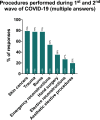Impact of COVID-19 pandemic on plastic surgery training in Europe
- PMID: 34973932
- PMCID: PMC8632853
- DOI: 10.1016/j.bjps.2021.11.090
Impact of COVID-19 pandemic on plastic surgery training in Europe
Abstract
Background: The COVID-19 pandemic has disrupted the functioning of global society and healthcare systems, including surgical departments. We aimed to assess alterations in plastic surgery training in Europe during the COVID-19 pandemic.
Methods: A 34-question survey was emailed in January and February 2021 to 54 National Associations of Plastic, Reconstructive, and Aesthetic Surgeons throughout European countries. The questions concerned the general profile of plastic surgery trainees, plastic surgery department, and training organization during the COVID-19 pandemic and its influence on respondents' health. The acquisition of responses was finalized at the end of February 2021.
Results: All 71 of the respondents reported alterations in planned courses, workshops, and conferences. Organizational changes included team rotation 62%, followed by redeployment to another department 45.1%. Reduction in admissions to the plastic surgery departments was more significant during the 1stt wave than the 2nd wave of COVID-19 pandemics. During the interim period, admission restrictions were proportional to the infection number. The most frequently reported surgical procedures performed were skin cancer surgeries, trauma, and burns (79%, 77%, and 77%). The majority, 62% of the respondents, noticed the negative impact of pandemics on training; 53.5% think their manual skills and clinical knowledge may deteriorate because of the pandemic. Respondents noticed that their mental (50.7%) and physical (32%) health worsened, along with feeling more stressed in general (57%).
Conclusion: The COVID-19 pandemic limited plastic surgery departments' activities and implementation of the plastic surgery training program in all European countries involved in our study.
Keywords: COVID-19; Coronavirus; Pandemic; Plastic surgery; Training.
Copyright © 2021 British Association of Plastic, Reconstructive and Aesthetic Surgeons. Published by Elsevier Ltd. All rights reserved.
Conflict of interest statement
Declaration of Competing Interest None.
Figures





Similar articles
-
Reflecting on Plastic Surgery Training During Early COVID-19 Pandemic: Resident Exposure and Telemedicine.J Craniofac Surg. 2022 Sep 1;33(6):1820-1824. doi: 10.1097/SCS.0000000000008471. Epub 2022 Jun 28. J Craniofac Surg. 2022. PMID: 35762598 Free PMC article.
-
The COVID-19 Pandemic and its Impact on Plastic Surgery in Europe - An ESPRAS Survey.Handchir Mikrochir Plast Chir. 2020 Jun;52(3):221-232. doi: 10.1055/a-1169-4443. Epub 2020 May 11. Handchir Mikrochir Plast Chir. 2020. PMID: 32392587 Review. English.
-
Impact of the COVID-19 pandemic on orthopaedic and trauma surgery training in Europe.Int Orthop. 2020 Sep;44(9):1611-1619. doi: 10.1007/s00264-020-04742-3. Epub 2020 Jul 21. Int Orthop. 2020. PMID: 32696334 Free PMC article.
-
A cross-sectional survey study of the impact of COVID-19 pandemic on the training and quality of life of Italian medical residents in the Lombardy region.Ann Med. 2022 Dec;54(1):2326-2339. doi: 10.1080/07853890.2022.2105392. Ann Med. 2022. PMID: 36001504 Free PMC article.
-
EASAPS/ESPRAS Considerations in getting back to work in Plastic Surgery with the COVID-19 Pandemic - A European point of view.Handchir Mikrochir Plast Chir. 2020 Aug;52(4):257-264. doi: 10.1055/a-1175-4169. Epub 2020 May 18. Handchir Mikrochir Plast Chir. 2020. PMID: 32422664 Review. English.
Cited by
-
Revision Rates in Cosmetic Plastic Surgery with and without Resident Involvement.Plast Reconstr Surg Glob Open. 2024 Mar 13;12(3):e5678. doi: 10.1097/GOX.0000000000005678. eCollection 2024 Mar. Plast Reconstr Surg Glob Open. 2024. PMID: 38481518 Free PMC article.
-
Impact of the COVID pandemic on mental health and training opportunities of Public Health Residents from 4 European countries: A cross-sectional study.Front Public Health. 2023 Mar 7;11:1044171. doi: 10.3389/fpubh.2023.1044171. eCollection 2023. Front Public Health. 2023. PMID: 36960373 Free PMC article.
References
MeSH terms
LinkOut - more resources
Full Text Sources
Medical

